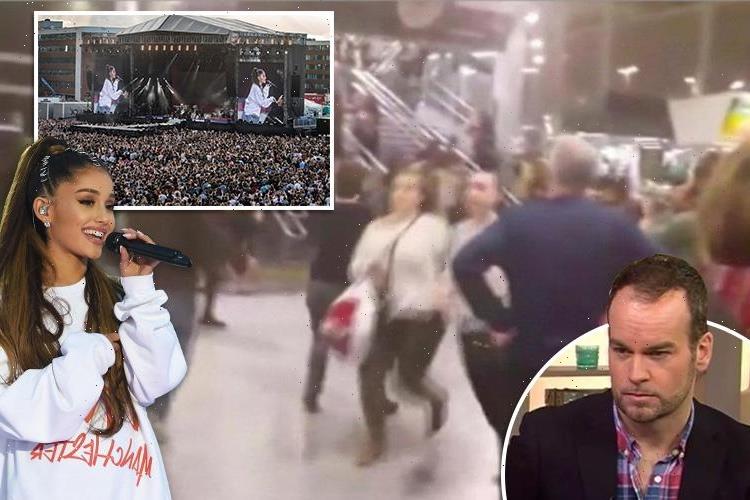TUESDAY is the one-year anniversary of the Manchester Arena atrocity. One year since a radical Islamist slaughtered people for the “crime” of having fun.
For the crime of being young and full of joy and free of cares.
For dancing and singing and giggling and Snapchatting.
All things that young girls love to do — and that Ariana Grande concert so ruthlessly targeted by an IS sympathiser was brimming with young girls — but which extreme Islamists consider “haram”.
One year since Britain experienced arguably its worst terror attack in living memory.
Not in terms of numbers: 22 souls were extinguished in that happy, bustling arena compared with 52 in the Tube and bus bombings in London on 7/7. But the worst in terms of the target: Concert-goers, children, girls. Our daughters.
And arguably the worst in terms of the message that the attack was designed to send to the whole nation: “Even your children aren’t safe. Even your girls are fair game for our barbarism.”
And yet after Manchester, after this assault on girlhood and liberty, something extraordinary happened: We clammed up.
We refused to talk about it. We shushed difficult debate.
Instead we turned the title of that great Oasis song — Don’t Look Back In Anger — into a not-so-great attitude to the problem of terrorism.
Don’t get angry, don’t think too hard about it. Just lay a flower in a public place, shed a tear or two and go back to your normal life.
That is what we were told to do post-Manchester.
Now, a year later, a year after this horrific assault on our children, it is time we changed the record. It is time we started to ask some very awkward questions about the rise of Islamist extremism.
A year later, perhaps we should look back in anger — both at what happened, and at the suffocation of public debate about what happened.
On the first anniversary, people are finally commemorating this apocalyptic assault.
There will be various services today, including a “Manchester Together” sing-along at Albert Square in Manchester, where local choirs will lead the public in a songful celebration of the lost lives.
Also, 28 trees have been planted — the “Trees Of Hope” — from Manchester’s Victoria Station to St Ann’s Square.
People are being invited to write messages of solidarity on cardboard tags and attach them to the trees.
No doubt this will all be of great comfort to the families of the dead and injured.
It will demonstrate the strength of Manchester, the fact that this city, in George Orwell’s words, is “the belly and guts of the nation”.
If you attack Manchester, you attack all Britons.
But we shouldn’t forget that over the past 12 months we have been encouraged . . . well, to forget.
To put the Manchester horror out of our minds. To avoid talking about it lest we offend anyone or give the impression that radical Islam is a serious problem.
For me, one of the most alarming things about 2017 was the speed with which the Manchester terror was erased from public consciousness.
Within weeks of this barbarism, people seemed to have forgotten it.
Or at least to have stopped raising it in polite society: To talk about Manchester was to commit a social faux pas. And this was not an accident. On the contrary, much of the political establishment seems hell-bent on gagging public discussion about Islamist extremism.
They have invented a battery of abusive terms to demonise those who suggest radical Islam is something we should talk about — and tackle.
Challenge Islamist thinking and you’re an “Islamophobe”.
This “phobe” word — and let’s not forget that a phobia is an irrational fear — is designed to write off certain political viewpoints as hysterical.
Things got so bad that in June last year, a month after the bombing, then Ukip leader Paul Nuttall was booed in a General Election TV debate simply for saying that the problem is “Islamist extremism”. You can’t utter the I-word, it seems.
Manchester music legend Morrissey summed it up.
In response to city mayor Andy Burnham’s assertion that the attack on Manchester was the work of an “extremist”, Morrissey asked: “An extreme what? An extreme rabbit?”
“Islamist” has become like Harry Potter’s “Voldemort” — a word you mustn’t say in public in case you stir up anger and resentment.
This cuts to the chase of why our “betters” discourage debate about Islamist extremism: Because they don’t trust us.
They don’t trust that we are capable of having a rational debate about such complex issues as Islam, extremism and the crisis of integration — the fact that many new arrivals seem unwilling to embrace British values these days.
MOST READ IN OPINION
TREVOR KAVANAGH Who the hell does Cummings think he is bragging about toppling Boris?
God save us from minor royals like Prince Andrew with major attitude problems
Ukraine needs our help. Being British means we stand up for FREEDOM
Britain is right to stand up to Putin and defend Ukraine's grateful citizens
Manchester Arena terror attack survivors Lucy Jarvis and Millie Robson talk about their injuries on This Morning
This is fundamentally what the Manchester horror revealed: That terrorists hold our lives in contempt, and the political class holds our opinions in contempt.
Radical Islamists want to hurt us. Our political superiors want to silence us. Enough.
A year on, let us make it clear that we will not be cowed by cowardly Islamist bombers nor silenced by a chattering class that fears us and our opinions almost as much as it does the planters of bombs.
- Brendan O’Neill is editor of spiked-online.com.
Source: Read Full Article











